

| A Second Chance |
| Narrated by Cai Tian-sheng Written by Chen Mei-yi Translated by Jenny Wen-chuan Chu |
About 80 percent of inmates return to jail after being released. I don’t want to be one of those. Love and accommodation have strengthened my desire to be good. Having received so much from others, I hope to give a helping hand to those who have trodden the same path as I.
At an anti-drug exhibition, Cai talks about his experiences with drugs and the harm they can do. Photo by Ding Mao-sheng
I was sent to jail 16 years ago for drug trafficking. I spent my days in prison reading and practicing calligraphy. At first I tried to hand-copy the Heart Sutra, but I eventually gave up because I couldn’t understand it. I turned to copying Jing Si Aphorisms by Master Cheng Yen. To my surprise, the more I copied it and pondered its meaning, the more inspired I felt. My parents came to see me in prison. My mother was in a wheelchair because she had just had an operation on her spine. I saw her get up from her wheelchair and, with the help of a walker, start walking toward me. Suddenly she fell. My father used every ounce of his strength to help her up, but he couldn’t. When I saw my beloved, elderly parents struggling on the floor, I collapsed. My mother eventually got up with the assistance of a security guard, and she sat down on the other side of a glass window from me. I grabbed the intercom and said in tears, “You’re not well, you shouldn’t have come.” My mother replied, “But I wanted to see my darling son.” At that moment, I wanted to die so I could stop being a torment to my parents. It was also at that moment that I completely sobered up.
Cai presents a drug awareness session at an elementary school. Photo by Shi Ken-cheng I was pretty smart when I was a child, and I did well in school. I was once my class president in elementary school, and I graduated with honors. But I took a turn for the worse after I entered junior high. I hung out with some bad characters, and I cut classes. I goofed around and took up smoking. In high school, I got into fistfights, stole stuff, and joined a gang. After my compulsory stint in the military, I worked as a bookmaker for an illegal lottery game and started doing drugs. I was eventually arrested for drug trafficking. The district court sentenced me to life imprisonment. I felt I was doomed, that there was no hope for me in this life. I remained angry, hostile, and unrepentant. It wasn’t until my parents paid me that visit that I came to see my stubborn foolishness and realize what a bad son I had been. I had trouble falling asleep at night, so I’d read to pass the time. That was when I stumbled upon Liao-fan’s Four Lessons. The author, Yuan Liao-fan (袁了凡, 1533-1606), reflected on himself and repented every day. By doing his best to do good deeds and refraining from doing wrong, he was able to change his destiny. I decided to follow his example in the hope of changing my destiny too. I created a merit/demerit chart like he did and began recording my good deeds and unwholesome thoughts. I used a red pen for the good and a blue pen for the bad. I tried my best to help inmates who were elderly or disabled—I fetched hot water for them and washed their underwear. Still, I recorded more blue than red at first—turning over a new leaf wasn’t such an easy thing. Gradually, however, the red increased and the blue decreased. Within only two months, I knew that I would change my destiny. I became a vegetarian to cultivate my compassion. Every day I chanted sutras, worshipped the Buddha, and repented of my past offenses. I read good books and copied the Great Compassion Mantra by hand. Other inmates saw what I was doing and pegged me as a “black sheep.” They would tease me for what I was doing, but I didn’t mind their teasing at all. I continued to do good things in prison and worked on enriching myself. The first time I read Tzu Chi Monthly magazine, I was deeply touched. I read it again and again. I told myself if I ever got out of jail, I would join Tzu Chi and become a volunteer. I wrote a letter to Master Cheng Yen about my wish, and I asked my father to buy books by the Master and mail them to me. When my case came before the Supreme Court, my fellow inmates advised me to deny the charges. But I knew better. Instead of following their advice, I confessed to every crime I had committed, and I sincerely expressed my regret to the justice. He must have seen my sincerity, for he reduced my life sentence to eight years. After that, I wrote once again to Master Cheng Yen, pledging to join Tzu Chi when I was out. I also told her of my decision to donate my body for medical research after I passed away. Nuns at the Jing Si Abode, the Buddhist convent founded by the Master in Hualien, often sent me books and audio tapes, which I used every day in prison. I looked forward with hope to a better future.
Cai says goodbye to soldiers after an event at a military base to promote filial piety and warn against drug use. Photo by Wang Xiu-yin I was released on parole after serving six years in prison. I was already 45 years old at the time. I’d learned to bake in prison, and a month after my release I landed a job as a baker. I didn’t forget my pledge to join Tzu Chi. I rode my motor scooter to the Taichung Tzu Chi office, but I was so ashamed of my past I couldn’t work up the nerve to enter the building. After circling around the area a couple of times, I finally mustered enough courage to go in. Yet, instead of telling the people inside I wanted to donate money and join Tzu Chi, I just bought a copy of Jing Si Aphorisms and hurried away. I decided to try another tactic. I figured that a phone call would be easier, so I called the office and said, “I want to donate some money….” Yang Qiu-xia (楊秋霞), a Tzu Chi commissioner, visited me at my home shortly after. When I stammered that I was an ex-con, she laughed and told me that she had a past too: She had once owned an illegal bar. “The door of Tzu Chi is open to everyone. Your past is the least of our concerns. What we care about is what you do in the future.” Under her guidance, I began volunteering for Tzu Chi. Thanks to arrangements made by a few volunteers, four of us ex-cons met Master Cheng Yen in person. The Master looked me in the eye and said, “A prodigal son has come home.” She continued: “People who can rein themselves in before it’s too late are true heroes.” I burst into tears right on the spot. At the time, I was just one step inside the door to goodness—I was still far from what I hoped to be. The Master says, “It is easy to reflect on major mistakes, but hard to eliminate small bad habits.” That’s exactly what I was like back then. I was too blunt, too rash, and too hotheaded. If it hadn’t been for the love and patient guidance of other Tzu Chi volunteers, I wouldn’t have been able to stay true to the right path. I thank them for instilling in me the Tzu Chi Four-Magic Soup: contentment, gratitude, understanding, and accommodation. After undergoing training, I finally received my certification as a Tzu Chi volunteer. I did my best to carry out every volunteer assignment. As a former convict and drug user, I was often asked by my fellow volunteers to counsel alcoholics, drug addicts, or former inmates. In this way, I made the acquaintance of many who had similar histories as me. A Tzu Chi sister who worked as a caregiver for hospital patients asked me to talk to a drug user who’d tried to kill himself by jumping off a building. He was only in his 30s, but he’d been addicted for 17 years. His mother had spent nearly ten million New Taiwan dollars (US$333,000) on him. He’d jumped off buildings twice before, but he’d been lucky enough to suffer only minor injuries. This time, the third time he tried to end his life, he broke both legs and injured his spine. I mindfully gave him some advice, but he relapsed again. He just wasn’t strong-willed enough to stay away from drugs. Even so, I wasn’t disheartened. I visited him at his home every day, and I enlisted the help of other volunteers. After some struggle, the young man finally pledged to quit drugs, and he and his mother both joined Tzu Chi.
Cai hugs an inmate during a visit at a prison. Photo by Luo Ming-dao
After my story broke in the media, a lot of drug addicts came to me for help. As one who had been through it I did what I could to help them, but after two or three years I came to realize that no one can kick an addiction purely on the strength of others. No matter how hard you work to pull people from that wrong path, if they don’t have enough resolution and perseverance, if they haven’t come to their senses, then your efforts will be in vain. Redemption is reserved for those who help themselves. On the other hand, if someone really wants to quit and you give him a helping hand, your help will go a long way toward helping him quit. Nine years ago, some friends and I opened a vegetarian restaurant in Taichung, central Taiwan. We did that to promote vegetarianism and to provide employment opportunities for people who were once behind bars.
Under Cai’s guidance, Lin Chao-qing (right) cleaned up his act and turned over a new leaf. Photo by Deng He-nan Among all the former convicts at the restaurant, Lin Chao-qing (林朝清) was the only one that I had met in prison. He was released earlier than me, but then he was jailed again. He came to see me after I joined Tzu Chi. By that time he had been in and out of prison three times. I told him what Master Cheng Yen had said to me when we met at the Jing Si Abode: “People who can rein themselves in before it’s too late are true heroes.” I encouraged him to show some real backbone and not be enslaved by drugs again. Business was good at the restaurant. Everyone worked hard. In summer we dripped with sweat as we cooked in the sweltering heat in the kitchen; in winter we washed vegetables in icy cold water. On our days off, I took my fellow workers to volunteer at a recycling station. During this period, I came across nearly a hundred drug addicts. Sometimes I’d feel stressed and frustrated in the process of guiding them to kick their addictions. However, when I thought of the pressure the Master must have been under—which must have been more than ten or even a hundred times the pressure I was under—I’d keep going. I’d tell myself to hang in there. A-long really broke my heart. He had been in and out of prison so many times his family had all but given up on him. I took him to volunteer at a recycling station and urged him to clean up his act. Despite my efforts, however, he went back to his old ways and was caught doing drugs again. His arrest even made the headlines: “Tzu Chi volunteer fails at quitting drugs.” I was speechless. I thought, “He’s barely started to volunteer, so how could he be called a ‘Tzu Chi volunteer’?” I felt really bad. I felt I had let the Master and other Tzu Chi volunteers down. I debated with myself whether I should give up on A-long or keep working with him. I finally chose the latter path. The Master says that you should never sit by when you see people suffer. I said to A-long, “I’ll give you one last chance. You can decide whether you want it or not.” This time, he finally came to his senses. He resolved to kick his addiction. He eventually underwent training and became a certified Tzu Chi volunteer. The Master once said to me, “Not everyone can do what you’re doing now.” Indeed, counseling and guiding drug addicts often left me physically and mentally exhausted. But all my efforts paid off when anyone that I had counseled turned over a new leaf and was certified as a Tzu Chi volunteer. When that happened, I’d be so happy I’d weep with joy.
In 2011 Da Ai TV produced a five-episode TV drama based on my story. It was later edited into a 90-minute version. The Ministry of Justice and the Ministry of Education each got 3,600 copies of the DVDs. After that I was often invited to prisons and schools to share my experience and spread my anti-drug message. Tzu Chi brother Chen Nai-yu (陳乃裕) accompanied me on all those trips to prisons and schools spread all across Taiwan. Wherever we went, we were warmly received by Tzu Chi volunteers in that area. I felt so warmed by their hospitality. However, being constantly on the go for anti-drug campaigns took a toll on my finances and health. Out of concern for me, some volunteers helped me start a second business, which we called The Biscuit Workshop. My father worked in the confectionery business when I was a child. I still remember his insistence on quality and the aroma of his home-made goodies. A feeling of bliss always arose in me when I smelled the sweet fragrance of his candies and cookies. Now, following his example, I keep a close tab on the ingredients we use and shun all unhealthy additives. We are bent on producing healthful biscuits and snacks that can bring a sense of delight to all those who eat them. Meanwhile I continue to visit prisons and schools, and I’ve also visited military bases to spread my anti-drug message. When I’m at home, my younger brother and I take care of our ailing mother. I chant sutras every day, no matter where I am. I worship the Buddha, make good vows, and repent of my past wrongs. I abide by the Tzu Chi precepts and constantly remind myself to never do anything bad again. On June 3, 2014, Chao-qing, my friend from prison, and I went to Taipei to receive awards which recognized people for their achievements in anti-drug efforts. When the vice-president of Taiwan, Wu Den-yih (吳敦義), handed the trophy to me, I was overwhelmed with emotion: I, a one-time drug addict and trafficker, was being recognized for anti-drug achievements. I felt at the same time repentant and grateful. I was repentant for having indulged in drugs and broken my parents’ hearts and caused harm to society, but I was grateful that despite my past Tzu Chi had taken me in with love. If not for that, I wouldn’t have become what I am today. On a trip to the Jing Si Abode, I presented the trophy to the Master. She said to me with a warm, kind smile, “Congratulations.” It has been exactly a decade since I joined Tzu Chi. I’ll continue to give warmth to others, just as others gave me warmth when I needed it the most. If you have done wrong, don’t be afraid to confess it. As long as you repent sincerely and genuinely want to stop doing bad, Tzu Chi will welcome you with open arms.
Cai has been a Tzu Chi volunteer for a decade. Here he volunteers at Dalin Tzu Chi Hospital and visits a nursing home for the elderly. Photos by Lin Yan-huang |



















|

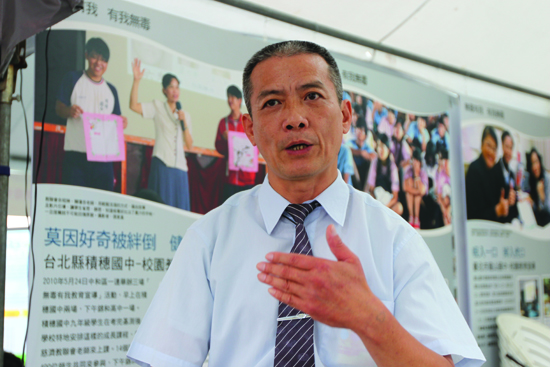
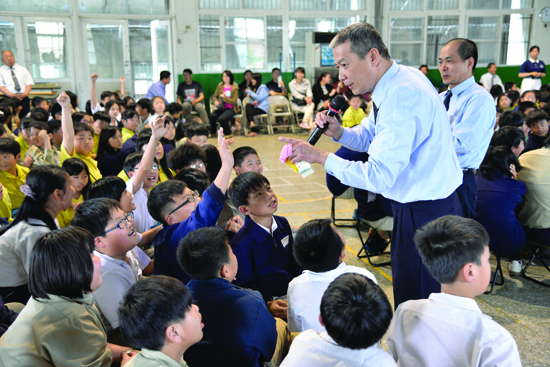
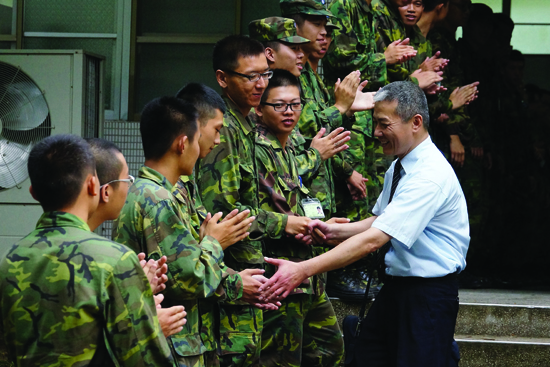
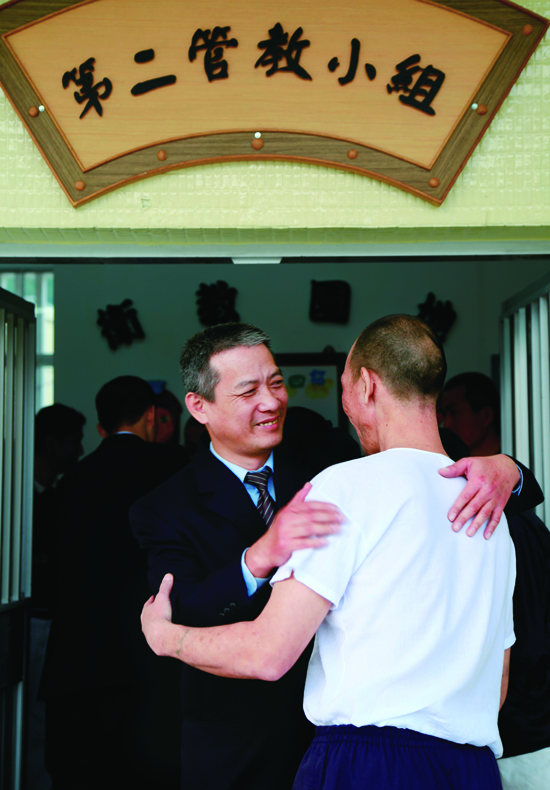
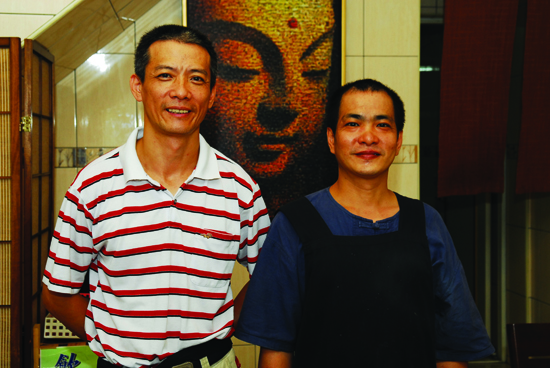
.jpg)
.jpg)